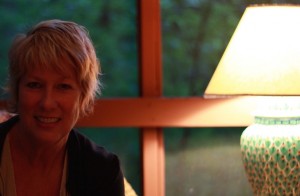During The Reign of M
From the beginning, the letter M hung over and shaded my life as if I had been birthed from the mouth of death. Sometimes it would be pleasantly cool in the eddying places of the M—mossy and green and well, meandering. But mostly I would get caught in the crux of the M and try without success to reach up and pull myself into the sun. Being fastened to the M was like being born in a meadow in the Midwest that a small river cuts through: all misery and mushy melodrama, mushrooms and mold, milk toast and milkweed, and I absolutely hated milk. As a young girl, Mother served whole milk in tall glasses, thick and unmoving—that made me gag and I was forced to drink or else I’d never be excused from my mother’s table. Ever. Sitting at the highly polished oval table on the cold slate tiles, the windows dark, staring at my untouched glass of milk, I saw myself growing old and my even older mother checking in to see how much I had managed to drink without a modicum of pity towards me even though she was on her way to death. And I made my way down the glass like the good martyr I was until it was bedtime and I could retire to mull the next day’s survival. A life of Mondays; imagine. Money and melancholy, maniacal machinations, manipulation, monotony, monogamy, mystery, manners, magpies, mud, missing things like love, trust, and happiness, mortgages, miniatures, mustard, mums, manners adhered to like plaster, mummies and mummification, metronome, marriage, no miracles, maximum detention, Moravian Seminary for Girls, always Mother, Mother, Mad Mother writ large in my girl story, mothballs and meringues, meaningful silences and stares, being woken up at midnight but not for mischief but to see my mother in her musty mint-green robe hanging over my bed with a cigarette burning in her hand, the Lady Macbeth of Macungie where I lived. During the reign of M, I fantasized about escaping into the letter H, crawling up one of its sides and sitting on its spiky peak above the fray. M inched along like a caterpillar, lumpy, rounded, soil mounded into gravesites or breasts, which were about the same. H was all lines, two thrusting straight up and one vertical, a crossroad, a bridge connecting the other two. I could see H burned into the hide of a steer, the stamp of territory. H had force, was not a mute, mild-mannered muddle. H sat at the front of the class and shot her arm up like a flash in response to the teacher’s question. H did not mutter under her breath and make it impossible to be heard. Speak up was what teachers said to M and not in tones of concern but said as if they’d like to munch her moth-pink lips right off her miserable face. H was a topper, a straight arrow, shooting for the stars. I pictured H standing on a hilltop surveying the world that lay before her. She would be hell bent on hilarity, heroism, putting her two shoulders to herculean labors. She would be a hellion rather than a mole, a hiccup rather than a murmur, a heroine rather than a mourner. When H appeared, crowds would send up a hooray rather than sink their heads and moan. H passed me once on the street in the bright morning light. She wore a red jacket with shoulder pads and her hair was burnished blonde like a helmet.
“ H,” I said softly, afraid.
“ What do you want?” she said. “ I’m late for an important appointment.”
“ H,” I muttered again.
“ Speak up, I can’t hear you.”
And on H went, without stopping. Eventually I accepted that no H awaited me, that M was my birthright, what I was and what I did, a marriage of sorts, the minion majestically holding up the edge of the casket merrily mincing steps on my way to the masquerade, remembering that touch has a memory, and that what touched me was M.
Blue Music
Always, after a storm, when the waters are no longer rising and the birds return to the air, I think about my death. I have read that in Bhutanese culture, as a cure for the fear of dying, one is encouraged to think about death five times a day. Of course I know nothing about Bhutanese culture, least of all why five is the magic number. Does the cure lessen if death is considered on a smaller scale? The power or weakness of my imagination is such that I can imagine my death only once.
What I don’t imagine is its cause. No car careens through a red light and T-bones me, ejecting me through the windshield. I’m not climbing the stairs with a heavy basket of laundry when the hemorrhage blossoms. It is simply my time to go. There is no getting away from this death, no dodge or swerve, fast twitch or slow march. I begin to fall from the sky and enter through a hole, a door, a mouth into . . . into . . . down into . . . deeper into . . . blue music.
Celestial blue, a blue that goes on forever, but a dusky blue like the sky darkening before night falls, a blue like the ragged wings of a heron poised in the mangroves on the edge of a shore, a blue like a bruise, like a vow of marriage broken. Beneath me a bottom that can’t be known or touched or reached. I am guileless, horizontal, not vertical, suspended, my arms raised up like posts, my legs bent back at the knees like a fetus.
No one accompanies me—no husband to my side, no foot of my son or daughter to pioneer. My sister’s drowned hair does not cover my face. They have gone on before me, or I have left them behind. No one is poised to catch me in my dying, but I have always been a swimmer, and swimmers are alone in the water. That is their private estate. When I was born, I tumbled down the slender shoot of my mother to the hands of the midwife, a sturdy woman with both legs braced to catch me, to pull me free and clear. Then she slapped me in blankets and whisked me down the hallway, in the opposite direction from my mother, who rolled away on her bed. I wanted to be placed in her arms, but it was not to be. I had no say then, I have no say now. So it is in our coming and going.
Now another descent. Only this time there will be no hands to reach for me, no crowning glory, no heralding into the world. I am falling out of the prickles and blood, and nothing will hold but this tender tangled blue where I will stay.
Marcia Aldrich is the author of the free memoir Girl Rearing, published by W.W. Norton. Companion to an Untold Story won the AWP Award in Creative Nonfiction. Her website is marciaaldrich.com.


